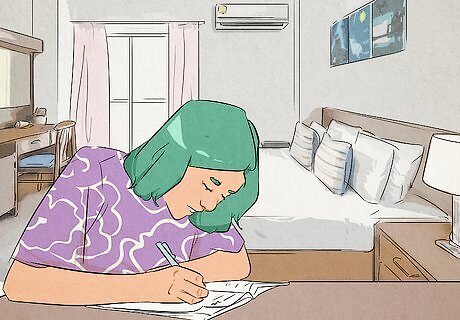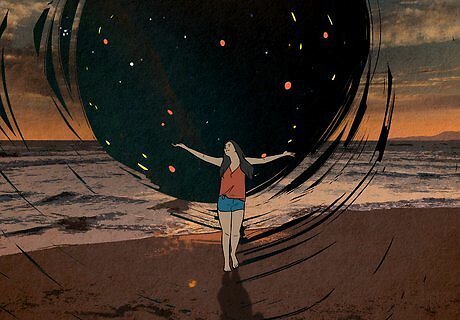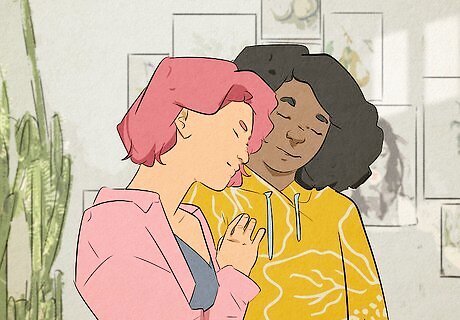
views
X
Research source
If you’re looking to learn more about this difficult but enlightening experience, you’ve come to the right place! We’ll go through the telltale signs and symptoms of a Dark Night of the Soul and how to cope with them.
- Signs and symptoms include feelings of purposelessness, losing interest in things you used to enjoy, and grappling with questions about spirituality.
- Journaling, trusting your intuition, embracing change, self-care, and working with a therapist can help you cope during the Dark Night of the Soul.
- The Dark Night of the Soul refers to the sense of meaninglessness and loss of purpose some people experience during a spiritual transformation or crisis of faith.
Signs & Symptoms of the Dark Night of the Soul

You feel a sense of meaninglessness or loss of purpose. The Dark Night of the Soul is typically triggered by a traumatic or shocking life event, such as the death of a loved one, a break-up or divorce, or an unexpected roadblock in your career. When these kinds of events happen, it destabilizes your previous plans and beliefs, which can leave you reeling. If you feel like you’re desperately searching for meaning and purpose in the wake of a shocking event, you might be experiencing the Dark Night of the Soul. For example, someone who has structured their life around becoming a successful dancer or athlete may experience a Dark Night of the Soul if they suddenly suffer an injury that makes this career path impossible. This event challenges the person’s previous understanding of their identity and collapses their sense of meaning, which could trigger the Dark Night of the Soul.

You feel powerless, helpless, or lost. As you grapple with questions about your identity and purpose, you might feel a sense of hopelessness. The struggles you’re facing might feel so big and serious that you don’t know where to start looking for answers, which can negatively affect your mood. Though the Dark Night of the Soul and depression can overlap, they aren’t the same thing. It’s possible, however, to confuse one for the other because they share some symptoms, such as feelings of hopelessness. If you think you might be depressed, you’re not alone. Seek out help from a medical professional as soon as possible to get treatment and address your symptoms.

You’re suddenly not interested in activities you used to love. The Dark Night of the Soul can dramatically shift your perspective, changing the way you feel about a lot of things in your life. Because of this, you might not find the same amusement in hobbies or activities you used to enjoy. For example, maybe you used to enjoy going out with friends for drinks after work, but now you don’t feel the same excitement or gratification in the activity.

Your definition of success is shifting. Because the Dark Night of the Soul pushes you to reevaluate your life, you’ll likely find that your idea of success is drastically changing. You might start thinking less about the material aspects of your life and instead focusing on your spiritual growth. Because of this, reaching new spiritual understanding may become more of a mark of success to you than reaching career milestones.

You’re grappling with questions of spirituality and the meaning of existence. The Dark Night of the Soul pushes you to confront the universe’s deepest mysteries. You’ll likely spend a lot of time contemplating big existential questions about the meaning of life, what happens after death, whether there’s a higher power, and what your purpose is. If these types of inquiries have been commanding your attention lately, you might be experiencing the Dark Night of the Soul.
How to Cope During the Dark Night of the Soul

Try journaling about your thoughts and experiences. If you’re living through the Dark Night of the Soul, you’re dealing with tons of deep feelings and difficult questions. Expressing these emotions in writing can be a helpful and cathartic way to process things and arrive at a better understanding of yourself. Plus, journaling is an important tool for managing anxiety, reducing stress, and coping with depression, which can help ease your experience of the Dark Night of the Soul.

Trust your intuition and listen to your inner voice. The turmoil of the Dark Night of the Soul can lead to fresh perspectives and a deeper understanding of spirituality. If you’re going through the Dark Night of the Soul, pay attention to your inner voice and don’t be afraid to follow your intuition. Your experience of grappling with life’s biggest mysteries could be bringing you closer to the spiritual wisdom within you!

Embrace change and growth, rather than resisting it. The Dark Night of the Soul is all about transformation and rebirth. As your perspective starts to shift, you’ll likely notice that you’re forming new opinions, interests, and desires. Instead of resisting these changes, let yourself explore them. It can be scary to let go of an old version of yourself, but it helps you grow into the person you’re meant to be! In fact, The Dark Night of the Soul is often thought of as an important (or even necessary) part of spiritual awakening. Many believe that the struggle it causes leads to clarity, connectedness, and a deeper understanding of life. If you believe you’re experiencing a Dark Night of the Soul, hang in there! Spiritual enlightenment might be right around the corner.

Practice self-care. During this intense and difficult period, it’s especially important to practice self-care. If you’re feeling overwhelmed or stressed, try to make time to do a relaxing activity, like taking a hot bubble bath, meditating, or reading a good book. Try to make it a priority to move your body and get some exercise—this can help you manage any symptoms of depression and anxiety accompanying your Dark Night of the Soul.

Lean on the people you love. It’s easy to get lost up in your head during the Dark Night of the soul, and you might start to isolate yourself. Meaningful connections with others, however, could be just what you need to find your way out of this existential crisis. Reach out to trusted friends or family members, and let them know what you’ve been going through. Their insights, advice, and support could help you navigate this tough time. Maintaining a connection with friends and family also plays an important role in managing depression symptoms.

Work with a therapist or counselor. If you’re struggling with depression or anxiety during your Dark Night of the Soul, a licensed therapist can help you cope with these conditions. Therapy can also provide you with a safe space to work through and process your existential questions. Ask a trusted friend or family member for a referral if they work with a therapist, or check out online directories to choose the right therapist for you.


















Comments
0 comment